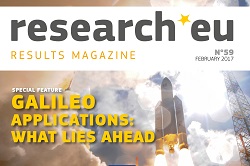Issue 59 of the research*eu results magazine – Galileo applications: what lies ahead
Kicked off 17 years ago, the Galileo project has finally materialised. Four additional satellites were launched in November 2016, bringing the constellation to a total of 18. Although more precision (down to the centimetre for professional services) is expected with the launch of an additional 12 satellites and upgrades of various ground elements by 2020, the current setup is enough for the whole system to have been declared operational since the end of last year. Now, all eyes are on what truly matters: useful, groundbreaking applications that will live up to the original Galileo promise: a fully European-controlled GNSS. In a recent interview, head of French Space Agency Jean-Yves Le Gall said about Galileo: ‘This opens the door to a host of applications, some of which we cannot even imagine yet.’ This capacity to conceive new kinds of applications for critical markets is, however, the very thing that will define the way people will look at Galileo over the next few years. For the EU to be able to consider European GNSS as a success, it will need substantial return on investment for the EUR 10 billion the programme has already cost. And this is where additional investment in Galileo-related research under FP7 and Horizon 2020 will be decisive. This issue of the research*eu results magazine presents results from eight projects, covering key sectors including transport, infrastructure works, smart cities, logistics, disaster management, maritime surveillance and citizen-oriented applications. Other topics in this edition include the following highlights: - Extra weight gain through yo-yo dieting - European and Central Asian countries are not doing enough to tackle corruption - New low energy heating system - New research warns of increased hurricane risk to the northeast United States - Satellites to monitor the Earth's water - Robo-Mate: from brain muscle gathering to heavy weight lifting - Building a sustainable, intelligent and power-efficient cloud - A proactive approach to ensuring long-term cybersecurity - Biochemical insight into cell division The research*eu results magazine is the main source of information for all findings related to EU-funded science projects. It covers a large spectrum of topics including biology and medicine, environment, energy, transport, ICT, industry, agriculture, society and space. It is published 10 times per year in English. For more information, sign up for a free subscription and to download the new edition, please visit: http://cordis.europa.eu/research-eu/magazine_en.html
Countries
Austria, Belgium, Bulgaria, Cyprus, Czechia, Germany, Denmark, Estonia, Greece, Spain, Finland, France, Croatia, Hungary, Ireland, Italy, Lithuania, Luxembourg, Latvia, Malta, Netherlands, Poland, Portugal, Romania, Sweden, Slovenia, Slovakia, United Kingdom



